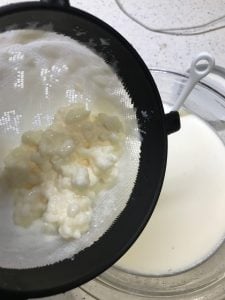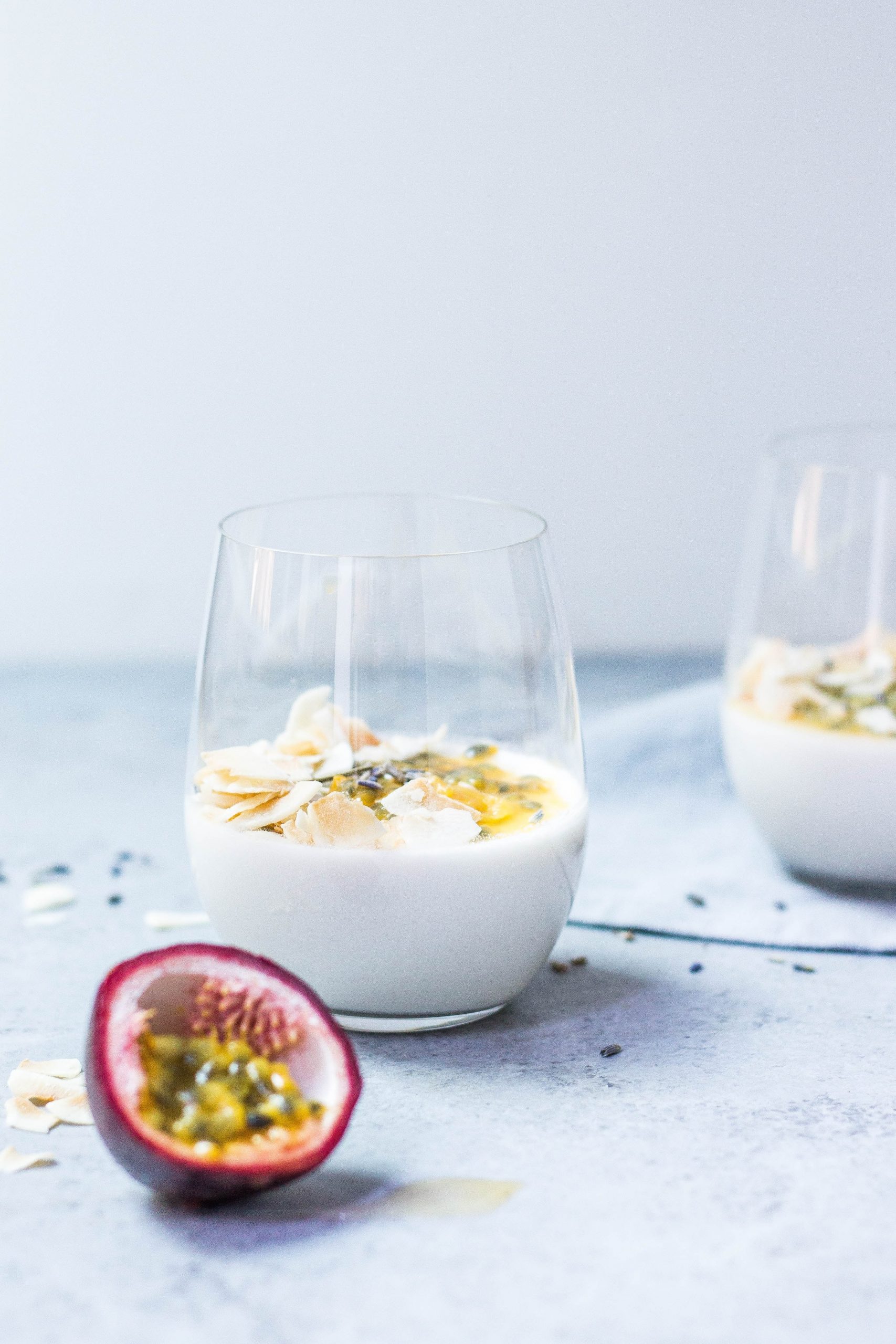I got serious about my digestive health a couple of years ago and that’s how I learned about kefir benefits.
I remember the first time I was introduced to it in Australia. My first reaction was ‘What is this clumpy stuff?’ Turns out it is all the rage in the natural health community!
So What Exactly Is Kefir?
The word kefir is derived from the Turkish word keyif, which means “feeling good” after its ingestion. (1)
It is a tart and tangy, creamy cultured milk smoothie that contains live and active probiotic cultures – the bacteria that makes our gut happy and healthy. It’s also high in protein, calcium and vitamin D.
Kefir is often called ‘The Champagne of Dairy’ thanks to its slightly effervescent and fizzy nature.
Think of it as a more powerful, more healthy version of yogurt. It lacks all of the sugar that a lot of processed yogurts carry and is jam-packed with probiotics.
(It’s no wonder that this has been popular in Eastern Europe for over 2000 years).
Here Are Just A Few Kefir Benefits.
- It balances digestive health. You’ve probably heard that yogurt is great for probiotic health, but I am here to tell you that kefir is better! Kefir grains contain about 30 strains of bacteria and yeast, so, therefore, is a very rich and diverse probiotic source.
- It supports and stimulates the immune system. Following on from point 1…Probiotics are known to help with immunity (2). The primary role of the gastrointestinal tract is to help digest and absorb nutrients. Kefir is a balanced and nourishing food that is packed full of probiotics and it keeps our gut flora balanced so we can absorb the proper nutrients which can also result in a better immune system.
- It has antibacterial properties. A few studies have been released to show that certain probiotics found in the kefir grains have antibacterial properties and can protect against harmful bacteria (3) (4).
- It can generally be tolerated by people who are lactose intolerant. The lactic acid bacteria in kefir pre-digests the lactose in milk and turns it into lactic acid. Because of this, kefir is generally well tolerated by people who are lactose intolerant (5). You can also make 100% lactose-free kefir by using coconut water, nut-milks or other non-dairy fluids. Basically, all you need is any liquid so the kefir grains can ferment and do their magic!
How Do I Make Kefir?
I make 2 batches every 2 weeks and store it in the fridge. I drink about ½ a cup per day.
There are tons of blogs and videos that will aid you in the process, but the bottom line is this…
What you’ll need
- Glass Milk Bottle Container
- Plastic strainer
- Wooden spoon
- Cheesecloth and rubber band
- Glass mason jar (I use an old pickle jar – cleaned of course)
- Large glass mixing bowl to strain the kefir into
- Kefir Grains
The Process
- Add 1 – 2 tablespoons of kefir grains into a small glass jar. The more you use, the faster it will culture.
- Add 2 cups of milk (preferably organic and raw milk) to the jar and leave about 1 inch of room so the liquid has room to expand. I use grass-fed, unpasteurized cow milk. You can play with using water or nut milk as well.
- Cover the top with a cheesecloth and secure with a rubber band. The kefir grains need to breathe in order to survive, so don’t cover with an airtight lid.
- Leave at room temperature for about 12 – 36 hours (depending on the temperature of your house this can vary). The warmer it is, the faster it will ferment.
Once the milk starts to look clumpy, then it is ready.
Grab a plastic strainer and a wooden spoon and begin straining the kefir into a new glass jar.
Note: Avoid using metal spoons or strainers in the process as they can contaminate the kefir grains.
Transfer the remaining kefir grains into a new jar, add milk and repeat the process.
Here is a How-To Video for the visual learners out there.
Where Can I Get Kefir Grains?
You can purchase a starter kit from the link below.
Don’t Feel Like Making It?
Don’t worry – I know we’re all busy. You don’t have to make it, but if you can get your hands on the grains, then I encourage it because it’s very simple to make!
However, when I’m short on time or am traveling, I personally drink Lifeway Kefir. Try and choose organic when you can!
P.S. – Now that Amazon bought Wholefoods in the USA, it’s even easier to get Kefir delivered straight to your doorstep. Ahhh convenience!
My Conclusion?
Western cultures tend to rely heavily on pharmaceuticals, but all we really have to do is look to nature to heal our bodies. Too many pharmaceuticals and antibiotics can really disrupt our gut flora, digestive health and ultimately our immune system.
Our bodies have a wonderful way of repairing themselves if given the proper food, rest and nutrition and Kefir is just one of the ways we can help our bodies repair themselves.
Happy fermenting!
Have you tried Kefir before or experienced any other Kefir benefits? Tell me below :)


0 Comments